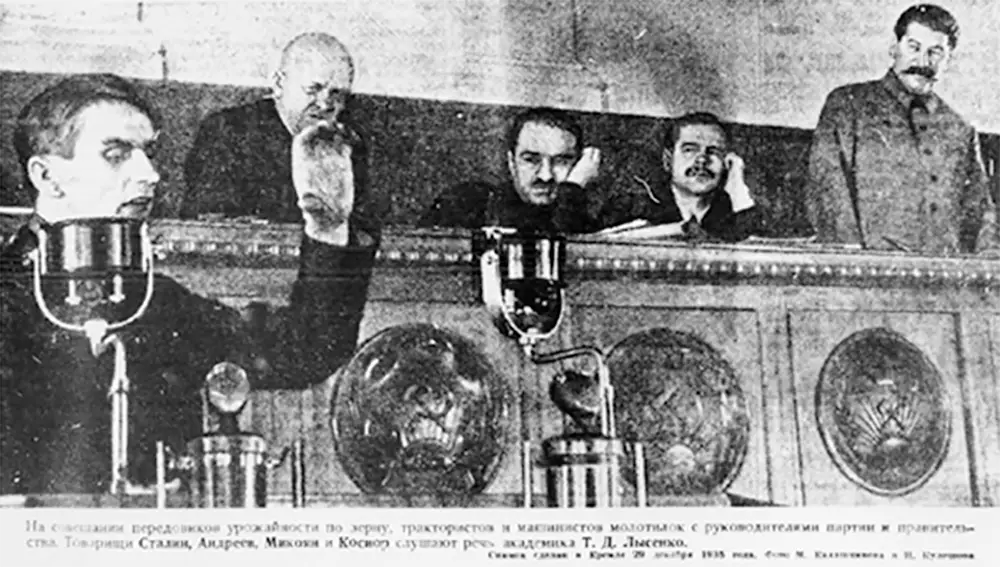Trofim Lysenko (1898-1976), a Soviet biologist, remains a divisive figure in scientific history, with his impact sparking both admiration and condemnation. Renowned for his contributions to agricultural advancements, Lysenko played a significant role in boosting grain yields during the formative years of the communist regime. However, his theories also bore responsibility for a catastrophic famine during the Stalin era, resulting in the loss of millions of lives.

According to an article in Current Biology, a significant factor behind Lysenko’s revival is the growing anti-Western sentiment in Russia. Supporters of Lysenkoism accuse genetic science of serving the interests of US imperialism while acting against Russia’s interests. Some perceive Lysenko as a heroic figure who defied Western influence and paved his own path. This newfound admiration for Lysenko is accompanied by a positive reassessment of Stalin, as evidenced by a recent poll where 47% of Russians expressed a liking for the dictator’s character and managerial qualities.
Trofim Lysenko should be noted that the adoption of Lysenkoism in China during the late 1950s resulted in even more severe famines, causing the deaths of at least 30 million people, with some resorting to cannibalism, as reported in an Atlantic feature. The historical consequences of Lysenko’s ideas serve as a stark reminder of the dangers posed by pseudoscience and the importance of rigorous scientific inquiry.
Following a decline in popularity among Soviet historians in 1965, Lysenko and his ideas became synonymous with pseudoscience, labeled as Lysenkoism. Nevertheless, there has been a recent resurgence of interest in Lysenkoism in Russia, driven by both recent epigenetic advancements and political factors.
Driven by his unwavering devotion to communism, Lysenko aimed to align scientific progress with the ideals of the Soviet revolution. Rejecting classical genetics on ideological grounds, this Marxist scientist argued against the notion of passing down identical genes to future generations, considering it a reinforcement of the existing social order. Instead, Lysenko fervently advocated for the idea that acquired life changes could be heritably transmitted to subsequent generations.
According to Trofim Lysenko, the environment alone played a decisive role in shaping plants and animals, aligning with the Soviet objective of creating a completely new individual. However, Lysenko’s implementation of this concept in Russian agriculture had severe consequences, causing extensive damage and significantly impeding agricultural and genetic research in the Soviet Union for years.

Trofim Lysenko rise to prominence in the Soviet Union can be attributed to his groundbreaking study on vernalization, a technique that involved chilling winter cereal seeds to mimic the behavior of spring cereals. This method proved invaluable in a country plagued by harsh winters and devastating famines resulting from forced collectivization. By enabling the planting of seeds in spring and subsequent harvests, Lysenko’s approach garnered widespread recognition, ultimately leading to his appointment as the head of the Soviet Academy of Agricultural Sciences by Stalin himself.
Expanding on his previous achievements, Lysenko put forth a major hypothesis suggesting that vernalized plants would pass on their acquired traits to future generations. However, it is now known that this hypothesis was likely based on fabricated research. Leveraging his influential position, Lysenko conducted large-scale experiments, including densely sowing seeds and abstaining from the use of fertilizers or pesticides across the entire state. Unfortunately, crops treated under Lysenko’s methods, such as wheat, rye, and potatoes, failed disastrously, as documented in Jasper Becker’s book, “Hungry Ghosts.” While ultimate responsibility for the devastating famine and the deaths of at least 7 million people lies with Stalin, Lysenko’s misguided techniques exacerbated the food crisis, leading to an incalculable loss of lives.
Lysenkoism, despite its disastrous consequences, is experiencing a resurgence in Russia for various reasons. One contributing factor is the expanding field of epigenetics, which focuses on changes in gene expression. Epigenetic research has revealed that certain environmental modifications can be inherited from parents to their offspring, aligning with a portion of Lysenko’s hypothesis. However, it is important to note that Lysenko himself rejected the existence of genes entirely, rendering his views scientifically inaccurate.

